译林版英语8BUnit5单词学案
牛津译林版八年级下学期学案:8B UNIT 5
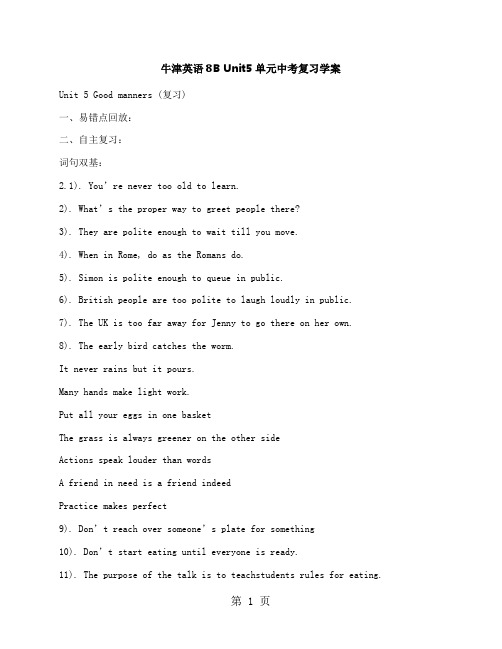
牛津英语8B Unit5单元中考复习学案Unit 5 Good manners (复习)一、易错点回放:二、自主复习:词句双基:2.1). You’re never too old to learn.2). What’s the proper way to greet people there?3). They are polite enough to wait till you move.4). When in Rome, do as the Romans do.5). Simon is polite enough to queue in public.6). British people are too polite to laugh loudly in public.7). The UK is too far away for Jenny to go there on her own.8). The early bird catches the worm.It never rains but it pours.Many hands make light work.Put all your eggs in one basketThe grass is always greener on the other sideActions speak louder than wordsA friend in need is a friend indeedPractice makes perfect9). Don’t reach over someone’s plate for something10). Don’t start eating until everyone is ready.11). The purpose of the talk is to teachstudents rules for eating.13). It is impolite to make too much noise while eating or drinking.三、语法知识疏理与反馈:1. ● to be (not ) adjective + enough + (for sb.)to do 用来描述一个人的品质和能力。
牛津译林版八年级英语下册Unit5 Good manners第五课时 导学案
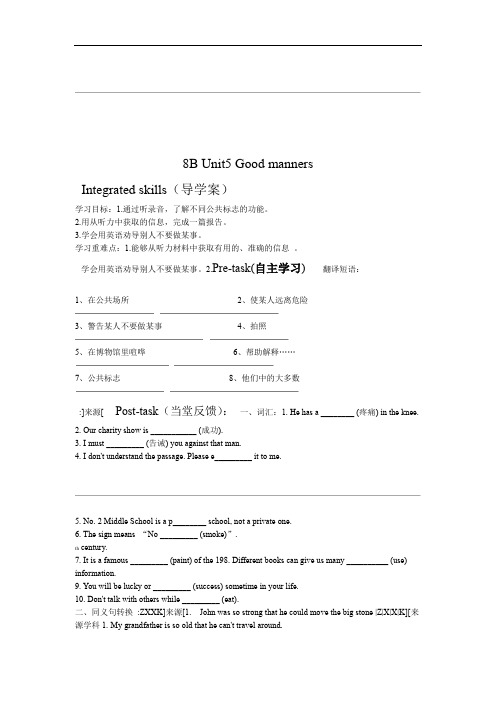
8B Unit5 Good mannersIntegrated skills(导学案)学习目标:1.通过听录音,了解不同公共标志的功能。
2.用从听力中获取的信息,完成一篇报告。
3.学会用英语劝导别人不要做某事。
学习重难点:1.能够从听力材料中获取有用的、准确的信息。
学会用英语劝导别人不要做某事。
2.Pre-task(自主学习) 翻译短语:1、在公共场所2、使某人远离危险3、警告某人不要做某事4、拍照5、在博物馆里喧哗6、帮助解释……7、公共标志8、他们中的大多数:]来源[Post-task(当堂反馈):一、词汇:1. He has a ________ (疼痛) in the knee.2. Our charity show is ___________ (成功).3. I must _________ (告诫) you against that man.4. I don't understand the passage. Please e_________ it to me.5. No. 2 Middle School is a p________ school, not a private one.6. The sign means “No _________ (smoke)”.th century.7. It is a famous _________ (paint) of the 198. Different books can give us many __________ (use) information.9. You will be lucky or _________ (success) sometime in your life.10. Don't talk with others while _________ (eat).二、同义句转换:ZXXK]来源[1. John was so strong that he could move the big stone |Z|X|X|K][来源学科1.My grandfather is so old that he can't travel around.2.Jack is too young to dress himself.3.It took the farmer the whole morning to grow the vegetables.__________________________________________________________________4.I don't know how I can start the game.__________________________________________________________________5.The problem is so hard that he can't work it out.__________________________________________________________________课后拓展:一、短文填词Will it matter if you don't take your breakfast? A short time ago, a test w_____ given in the USA. People of different a______, from 12 to 83, were asked to have a test. During the test, these people weregiven all kinds of breakfast and s__________ they got no breakfast at all. Scientists wanted to seeh____well their bodies worked when they had eaten different kinds of breakfast.The results show that if a person e_____ a right breakfast, he or she will work better than if he or she has no breakfast. If a student has fruit,eggs, bread and milk b_______ going to school, he will learn morequickly a____ listen more carefully in class.The results a_____ show that having no breakfast will not h______ you lose weight. This is because people bee so h_______ at noon that they eat too much for lunch. So they will gain weight instead of losingweigh二、任务型阅读The Slender West Lake Scenic Spot lies in the northwestern part of Yangzhou, with its south gate facing Great Rainbow Bridge Road. It covers an area of about 123.6 hectares. The Slender West Lake wasnamed a National Key Scenic Spot in 1988 and National AAAAA Tourist Area in 2010.The Slender West Lake used to be a long river named the Baozhang Lake, which is 4 kilometers in length and less than 100 meters in width. A famous poet Wang Hang in the Qing Dynasty once posed a poem (诗歌), from which the Slender West Lake gets its present name and to which it owes its great fame(名声) both at home and abroad.During the Sui and Tang Dynasties, many gardens were built along the Slender West Lake. Following the lines of the natural landscape, a large number of buildings along the moats(护城河) were constructed(建造) in different locations during different periods. Emperors Kangxi and Qianlong of the Qing Dynasty both visited the Slender West Lake.The Slender West Lake Scenic Spot is an outstanding representative (代表) of the lake gardens in China. In a word, the Slender West Lake not only represents the beauty of natural landscape(风景), but also embodies (体现) the richness of its history and culture.The Slender West Lake附件1:律师事务所反盗版维权声明附件2:独家资源交换签约学校名录(放大查看)学校名录参见:://.zxxk./wxt/list. aspx?ClassID=3060[来源:学。
牛津译林版英语八下《Unit 5 International charities》word学案(10课时全)

8B Unit 5分课时教学要求(Period One)句msentences巩固练习that his parents gave, so he wants to buy a ne3. He feels so w____ that he4. We wi ll be good friend s a_________ (2. We have a little time ____(leave).Le t4. He used to _____(visit) the Great Wall.8B Unit5分课时教学要求(Period Two / Three)case,med ical,med ical plane teaching centre, watchpe to help more people, be grateful to sb., carry on withneed to work very quickly, but I`m used to it.难句done such an important job that people must be really grateful.2. Many of our patients are so poor that they can`t afford to travel to hosp3.Modern medicine i s developing so quickly that we can treat and cure moxt eye problems ane improve的用法。
2. The doctor told us6. T he people with eye problems can get8B Unit 5分课时教学要求(Period Four)an advertiUNICEF wants to make the world a better place for2. We made _____________ (advertise) on TV.5. The poor patient sh ould6. Tom hopes that more people can send _________ (donate) totheir work.8B Unit 5分课时教学要求(Period Five/ Period Six)teon / in doingI am (not) used to the hot weather / drinking coffer.so that , such that点,并There ______ be a beau tiful park.He ________ work for a company, bu t now he has his own companthat / su chThey walked a long way. They felt very tired.John works hard.generous person. She donates all her pock er money to 8B Unit 5分课时教学要求(Period Seven/Eight)instead, reserach词组voluntary wter UNICEF raises money by se lling Ch ristmas cards and organizing other孩子们的生活由于战争而改变。
牛津译林版8BUnit5(1-4课时)教学案
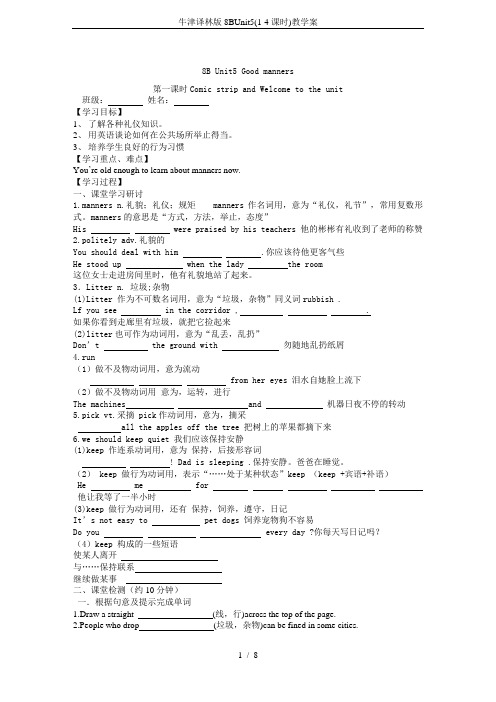
8B Unit5 Good manners第一课时Comic strip and Welcome to the unit班级:姓名:【学习目标】1、了解各种礼仪知识。
2、用英语谈论如何在公共场所举止得当。
3、培养学生良好的行为习惯【学习重点、难点】You’re old enough to learn about manners now.【学习过程】一、课堂学习研讨1.manners n.礼貌;礼仪;规矩 manners作名词用,意为“礼仪,礼节”,常用复数形式。
manners的意思是“方式,方法,举止,态度”His were praised by his teachers 他的彬彬有礼收到了老师的称赞2.politely adv.礼貌的You should deal with him .你应该待他更客气些He stood up when the lady the room这位女士走进房间里时,他有礼貌地站了起来。
3.Litter n. 垃圾;杂物(1)Litter 作为不可数名词用,意为“垃圾,杂物”同义词rubbish .Lf you see in the corridor , .如果你看到走廊里有垃圾,就把它捡起来(2)litter也可作为动词用,意为“乱丢,乱扔”Don’t the ground with 勿随地乱扔纸屑4.run(1)做不及物动词用,意为流动from her eyes 泪水自她脸上流下(2)做不及物动词用意为,运转,进行The machines and 机器日夜不停的转动5.pick vt.采摘 pick作动词用,意为,摘采all the apples off the tree 把树上的苹果都摘下来6.we should keep quiet 我们应该保持安静(1)keep 作连系动词用,意为保持,后接形容词! Dad is sleeping .保持安静。
爸爸在睡觉。
(2) keep 做行为动词用,表示“……处于某种状态”keep (keep +宾语+补语)He me for 他让我等了一半小时(3)keep 做行为动词用,还有保持,饲养,遵守,日记It’s not easy to pet dogs 饲养宠物狗不容易Do you every day ?你每天写日记吗?(4)keep 构成的一些短语使某人离开与……保持联系继续做某事二、课堂检测(约10分钟)一.根据句意及提示完成单词1.Draw a straight (线,行)across the top of the page.2.People who drop (垃圾,杂物)can be fined in some cities.3.Soldiers are expected to _(遵守,服从)orders without questioning them.4.We are going to the farm to p apples.5.I think it’s our (轮流)to drive the kids to school this week. 二.用所给词的适当形式填空。
牛津译林版英语八年级下册8BUnit5 教案
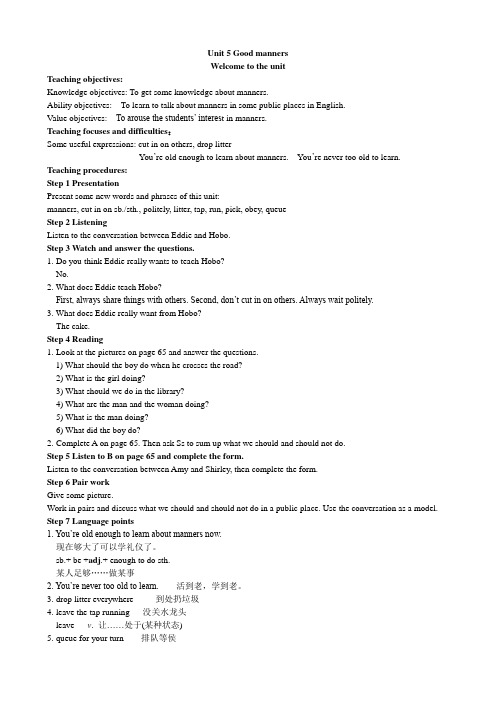
Unit 5 Good mannersWelcome to the unitTeaching objectives:Knowledge objectives: To get some knowledge about manners.Ability objectives: To learn to talk about manners in some public places in English.Value objectives: To arouse the students’ interes t in manners.Teaching focuses and difficulties:Some useful expressions: cut in on others, drop litterYou’re old enough to learn about manners. You’re never too old to learn. Teaching procedures:Step 1 PresentationPresent some new words and phrases of this unit:manners, cut in on sb./sth., politely, litter, tap, run, pick, obey, queueStep 2 ListeningListen to the conversation between Eddie and Hobo.Step 3 Watch and answer the questions.1. Do you think Eddie really wants to teach Hobo?No.2. What does Eddie teach Hobo?First, always share things with others. Second, don’t cut in on others. Always wait politely.3. What does Eddie really want from Hobo?The cake.Step 4 Reading1. Look at the pictures on page 65 and answer the questions.1) What should the boy do when he crosses the road?2) What is the girl doing?3) What should we do in the library?4) What are the man and the woman doing?5) What is the man doing?6) What did the boy do?2. Complete A on page 65. Then ask Ss to sum up what we should and should not do.Step 5 Listen to B on page 65 and complete the form.Listen to the conversation between Amy and Shirley, then complete the form.Step 6 Pair workGive some picture.Work in pairs and discuss what we should and should not do in a public place. Use the conversation as a model. Step 7 Language points1. You’re old enough to learn about manners now.现在够大了可以学礼仪了。
牛津译林版单元复习学案 (8B Unit5)-精选教学文档
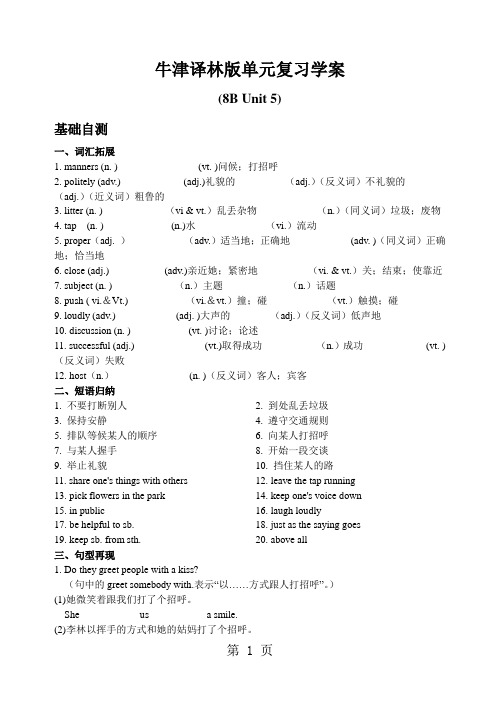
牛津译林版单元复习学案(8B Unit 5)基础自测一、词汇拓展1. manners (n. ) _______________ (vt. )问候;打招呼2. politely (adv.)____________ (adj.)礼貌的__________(adj.)(反义词)不礼貌的________ (adj.)(近义词)粗鲁的3. litter (n. ) ____________(vi & vt.)乱丢杂物____________(n.)(同义词)垃圾;废物4. tap (n. )_____________ (n.)水_____________(vi.)流动5. proper(adj. )___________(adv.)适当地;正确地____________(adv. )(同义词)正确地;恰当地6. close (adj.) __________ (adv.)亲近她;紧密地_________(vi. & vt.)关;结束;使靠近7. subject (n. ) ____________(n.)主题_____________(n.)话题8. push ( vi.&Vt.) ___________(vi.&vt.)撞;碰____________(vt.)触摸;碰9. loudly (adv.)____________(adj. )大声的________(adj.)(反义词)低声地10. discussion (n. )___________ (vt. )讨论;论述11. successful (adj.)______________(vt.)取得成功___________(n.)成功____________ (vt. )(反义词)失败12. host(n.)_______________(n. )(反义词)客人;宾客二、短语归纳1. 不要打断别人___________________2. 到处乱丢垃圾_____________________3. 保持安静_______________________4. 遵守交通规则_____________________5. 排队等候某人的顺序_______________6. 向某人打招呼_____________________7. 与某人握手_______________________8. 开始一段交谈____________________9. 举止礼貌________________________ 10. 挡住某人的路____________________ 11. share one's things with others _________ 12. leave the tap running ________________ 13. pick flowers in the park _____________ 14. keep one's voice down _______________ 15. in public __________________________ 16. laugh loudly _______________________ 17. be helpful to sb. ____________________ 18. just as the saying goes _______________19. keep sb. from sth. __________________ 20. above all __________________________三、句型再现1. Do they greet people with a kiss?(句中的greet somebody with.表示“以……方式跟人打招呼”。
牛津译林版英语8Bunit5Task教学设计

在本章节的教学中,学生将培养以下情感态度与价值观:
1.培养学生对世界各国传统文化的兴趣和尊重,提高跨文化交际能力。
2.培养学生积极参与课堂活动,主动与同学交流合作的意识。
3.培养学生热爱祖国,弘扬中华民族优秀传统文化,增强民族自豪感。
4.培养学生具有全球意识,关注世界和平与发展,树立正确的人生观和价值观。
5.视听作业:
观看一部与节日相关的英文电影或纪录片,例如《舌尖上的中国》英文版中的春节特辑,关注其中与节日相关的英语表达,并尝试模仿影片中的发音和语调。
2.能够运用一般现在时和一般过去时描述节日的活动及习俗,提高英语语法运用能力。
3.能够通过阅读和理解相关文本,获取关键信息,提高阅读理解能力。
4.能够运用所学知识编写一段关于传统节日的对话或短文,提高写作能力。
5.能够通过小组合作,进行信息交流和分享,提高口语表达能力。
(二)过程与方法
在本章节的教学过程中,学生将采用以下方法学习:
(5)注重写作过程的指导,从选词、造句到篇章结构,逐一突破写作难点。
2.教学过程设想:
(1)导入:利用图片、视频等多媒体资源,引导学生谈论自己了解的传统节日,激发学习兴趣。
(2)新知呈现:通过文本阅读,让学生了解世界各地的传统节日及习俗,学习本节课的重点词汇和句型。
(3)实践练习:设计不同类型的练习题,让学生在完成练习的过程中,巩固所学知识。
c.教师总结:Today, we have learned about different traditional festivals and customs around the world. We should respect and appreciate the cultural diversity. In the process, we have improved our English language skills.(今天,我们了解了世界各地的传统节日和习俗,我们应该尊重并欣赏文化的多样性。在这个过程中,我们提高了英语语言能力。)
译林版英语8B Unit5 Good manners全单元教案
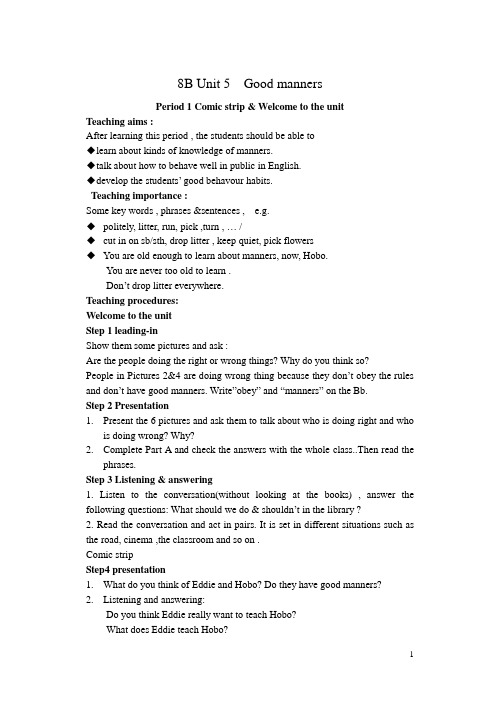
8B Unit 5 Good mannersPeriod 1 Comic strip & Welcome to the unitTeaching aims :After learning this period , the students should be able to◆learn about kinds of knowledge of manners.◆talk about how to behave well in public in English.◆develop the students’ good behavour habits.Teaching importance :Some key words , phrases &sentences , e.g.◆politely, litter, run, pick ,turn , … /◆cut in on sb/sth, drop litter , keep quiet, pick flowers◆You are old enough to learn about manners, now, Hobo.You are never too old to learn .Don’t drop litter everywhere.Teaching procedures:Welcome to the unitStep 1 leading-inShow them some pictures and ask :Are the people doing the right or wrong things? Why do you think so?People in Pictures 2&4 are doing wrong thing because they don’t obey the rules and don’t have good manners. Write”obey” and “manners” on the Bb.Step 2 Presentation1.Present the 6 pictures and ask them to talk about who is doing right and whois doing wrong? Why?plete Part A and check the answers with the whole class..Then read thephrases.Step 3 Listening & answering1. Listen to the conversation(without looking at the books) , answer the following questions: What should we do & shouldn’t in the library ?2. Read the conversation and act in pairs. It is set in different situations such as the road, cinema ,the classroom and so on .Comic stripStep4 presentation1.What do you think of Eddie and Hobo? Do they have good manners?2.Listening and answering:Do you think Eddie really want to teach Hobo?What does Eddie teach Hobo?What does Eddie really want from Hobo?Read after the CD , and pay attention to their pronunciation and intonation . Read again in different roles .Step 5【课堂小结】Language points1.You are old enough to learn about manners, Hobo.2.don’t cut in on others. Wait politely.3.You are never too old to learn..4.Drop litter everywhere.5.Leave the tap running.6.obey the traffic rules.7.queue for your turnStep 6 Homework◆Revise the expressions we’ve learned in this period .◆Recite the comic strip fluently .◆Finish Period 1 in workbook◆Pre-learn Reading .Periods 2 Reading1Teaching aims :After learning this period , the students should be able to◆read and learn the interview about manners.◆get some information about manners in the UK◆identify specific details by answering some questions.◆d evelop the students’ ability of guessing new words’ meanings fromthe context ...Teaching importance :Some key words , phrases &sentences , e.g.◆proper, kiss, close, conversation, avoid, subject, public, push, touch, excuse..◆shake one’s hand, in public, push in, in one’s way, as well, by accident,excuse me.◆What’s the proper way to greet people there?British people only greet relatives or close friends with a kissThey will say “Excuse me”and be polite enough to wait till you move. …Teaching procedures:Step 1RevisionTalk about the pictures on Page65. then ask:Step 2PresentationLook at the pictures and learn manners in the UK ,such as:greet relatives or close friends with a kissavoid asking age, weight or moneyavoid asking age, weight or moneynever push in othersnever shout or laugh loudlysay “please” or “thank you” all the timeStep 3 Reading1.Skimming:What is the conversation about?Who is Daniel talking to?2.ScanningHow do people greet others for the first time?How do people start a conversation?How do people behave politely in public?How do people be polite at homeDo they talk about age?Step 4 Complete Part B1 & B2,then check the answers together. Step 5 Homework◆Read the conversation again and again .◆Finish Period2.in WbReading 2Teaching aims :After learning this period , the students should be able to◆learn and use the expressions to talk about manners.◆learn more about western customs.◆behave politely in public after readingStep 1 Revision & Presentation1.Recall the contents of the articles by talking about some manners in the UK.2.Free talk(Part C)How do we greet others?How do we start a conversation?Do we greet others with a kiss?Do we always queue in public?Do we shout or laugh in public?Do we push past when someone is in our way?Do we say “sorry” when we bump into someone?Do we say “please” or “thank you” at home?Step 2 Complete Part B3,and read it after checking the answers.Step 3. Learning some language points by creating some real situationsa.shake sb’s handb.greet close friends with a kissc.behave politely in publicd.push in before others /push paste.bump into someonef.in one’s wayg.as wellh.all the timei.just as the saying goesj.be polite enough to wait till you moveStep4 Practice Encourage ss to ask some questions if they have problems. Step 5 Exercises P48 in WbStep 6Homework◆Recite the conversation in pairs.◆Finish period3 in workbook◆Pre-learn Grammar .:ask them to find examples in the first two periods.Periods 4-5 Grammar(A&B)Teaching aims :After learning this period , the students should be able to◆learn how to describe a person’s personality and ability with “enough to”◆learn to use “too…to” to express a negative result.◆use the two structures correctly t o change the structuresTeaching importance :1) Some key words , phrases &sentences , e.g.◆discussion express◆make everyone laugh, on her own , express himself clearly ,be busy with ◆You are old enough to learn about manners.The UK is too far away for Jenny to go there on her own.British people are too polite to shout loudly in public.Teaching procedures:A Using” enough to”Step 1 Presentation1)Recall Ss the sentences with “enough to…”we have learnt in the first twoperiods.You are old enough to learn about manners.British people are polite enough to wait till you move.2)Guide Ss to find the same point in the structure:to be + enough = adjective + to do sth. We use this structure to describe a person’s personality and abilityGive them some more examples .Step 2 PracticeGo through the exercises in the book, then ask them to finish them. After checking the answers ,read the sentences ,loudly.B Using “too…to”Step 1 Lead-inJoin two sentences together1.British people are very polite. They do not shout loudly in public.British people are polite shout loudly in public.2. British people are very polite. They will not push past you.British people are polite push past you.Tell Ss that we use‘too…to ’to express a negative result. Sometimes we need to add “for someone”before the “to do sth”. Write the senrence on the Bb ;The UK is too far away for Jenny to go there on her own.Then read the models aloud.Step 2 Practice1) Guide Ss to do Exercise1 on p71, then ask them to finish the other exerciseson p71 alone . Check the answers and read loudly .2) Some more exercises : Translate the sentences:1.太小了而不能上学。
牛津译林版英语 8B八年级下册 Unit5 教案

Designing aims
Step1:Leading-in
Good manners are very important in our daily lives.
1.Do you have good manners?
2.What do you always do if you want to show good manners to others?
4. Act it out.
听前的设问和表格有利于学生快速的获取信息,加强理解。对话的操练让学生熟悉目标语言知识为下面的语言运用做准备。创设不同的情景,为学生提供真实的语境,让学生在实践中获得学习的快乐和成就感,同时为拓展环节的语言输出做好语言铺垫。
Step5:Group Work: A competition.
We should/shouldn't...”
通过本环节的复习和巩固,一方面可以唤起学生对之前已经学习过的内容的复习,另一方面提高学生的语言表达能力。
Step2:Presentation
1.Free talk
(1) What traditionalmanners do you know in China?
(2) Toidentify specific details by answering some questions.
(3)To develop the students’ ability of guessing new words’ meanings from the context.
3.Value objectives:
Step3:Presentation
1.Present the six pictures and ask the students to talk about who is doing right and who is doing wrong? Why?
英语:Unit 5 学案(译林牛津版八年级下)
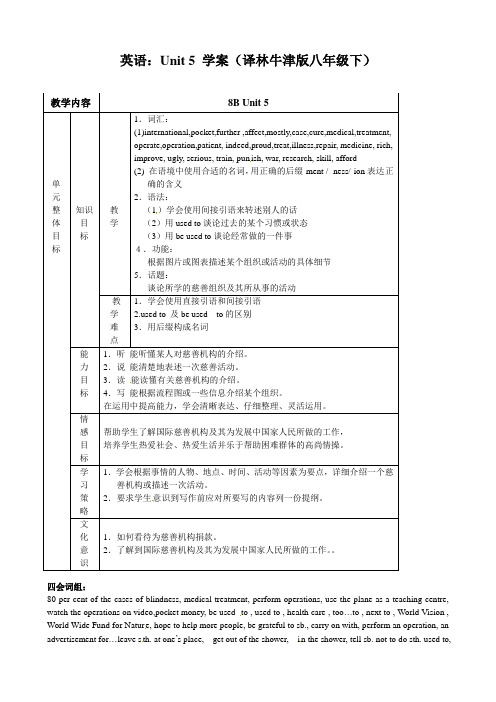
英语:Unit 5 学案(译林牛津版八年级下)四会词组:80 per cent of the cases of blindness, medical treatment, perform operations, use the plane as a teaching centre, watch the operations on video,pocket money, be used to , used to , health care , too …to , next to , World Vision , World Wide Fund for Natur e, hope to help more people, be grateful to sb., carry on with, perform an operation, an advertisement for …leave s th. at one ’s place, get out of the shower, i n the shower, tell sb. not to do sth. used to,教学内容8B Unit 5单 元 整 体 目 标知识 目 标教 学1.词汇:(1)international,pocket,further ,affect,mostly,case,cure,medical,treatment, operate,operation,patient, indeed,proud,treat,illness,repair, medicine, rich, improve, ugly, serious, train, pun ish, war, research, skill, afford (2) 在语境中使用合适的名词,用正确的后缀-ment / -ness/-ion 表达正确的含义 2.语法:(1)学会使用间接引语来转述别人的话 (2)用used to 谈论过去的某个习惯或状态 (3)用be used to 谈论经常做的一件事 4.功能:根据图片或图表描述某个组织或活动的具体细节 5.话题:谈论所学的慈善组织及其所从事的活动 教 学 难 点1.学会使用直接引语和间接引语 ed to 及be used to 的区别 3.用后缀构成名词能 力 目 标 1.听 能听懂某人对慈善机构的介绍。
牛津译林版8BUnit5(1-4课时)教学案

8B Unit5 Good manners第一课时Comic strip and Welcome to the unit班级:姓名:【学习目标】1、了解各种礼仪知识。
2、用英语谈论如何在公共场所举止得当。
3、培养学生良好的行为习惯【学习重点、难点】You’re old enough to learn about manners now.【学习过程】一、课堂学习研讨1.manners n.礼貌;礼仪;规矩 manners作名词用,意为“礼仪,礼节”,常用复数形式。
manners的意思是“方式,方法,举止,态度”His were praised by his teachers 他的彬彬有礼收到了老师的称赞2.politely adv.礼貌的You should deal with him .你应该待他更客气些He stood up when the lady the room这位女士走进房间里时,他有礼貌地站了起来。
3.Litter n. 垃圾;杂物(1)Litter 作为不可数名词用,意为“垃圾,杂物”同义词rubbish .Lf you see in the corridor , .如果你看到走廊里有垃圾,就把它捡起来(2)litter也可作为动词用,意为“乱丢,乱扔”Don’t the ground with 勿随地乱扔纸屑4.run(1)做不及物动词用,意为流动from her eyes 泪水自她脸上流下(2)做不及物动词用意为,运转,进行The machines and 机器日夜不停的转动5.pick vt.采摘 pick作动词用,意为,摘采all the apples off the tree 把树上的苹果都摘下来6.we should keep quiet 我们应该保持安静(1)keep 作连系动词用,意为保持,后接形容词! Dad is sleeping .保持安静。
爸爸在睡觉。
(2) keep 做行为动词用,表示“……处于某种状态”keep (keep +宾语+补语)He me for 他让我等了一半小时(3)keep 做行为动词用,还有保持,饲养,遵守,日记It’s not easy to pet dogs 饲养宠物狗不容易Do you every day ?你每天写日记吗?(4)keep 构成的一些短语使某人离开与……保持联系继续做某事二、课堂检测(约10分钟)一.根据句意及提示完成单词1.Draw a straight (线,行)across the top of the page.2.People who drop (垃圾,杂物)can be fined in some cities.3.Soldiers are expected to _(遵守,服从)orders without questioning them.4.We are going to the farm to p apples.5.I think it’s our (轮流)to drive the kids to school this week. 二.用所给词的适当形式填空。
牛津译林版英语八下《Unit 5 International Charities》(reading)word学案
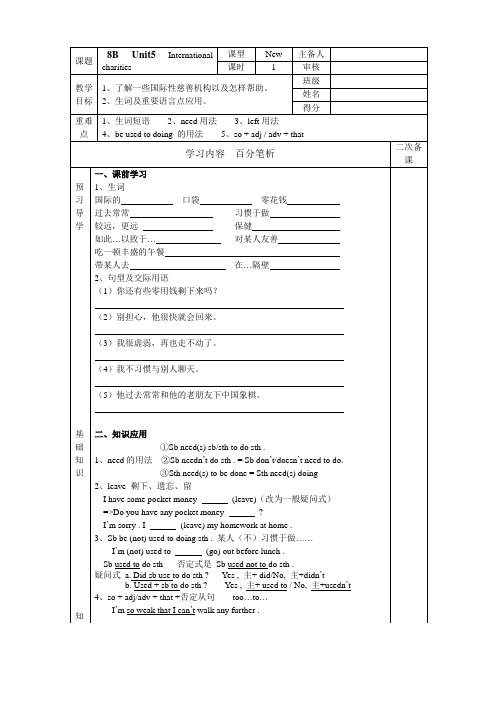
() 9、He isweakhe cannot do any more work.
A. such ,that B. so…that C. so ,as to D. so much , that
in the world .
5、Tom is so tired and hungry that he can’t walk any f.
() 6、---Have you get any money?
---I need to borrowfrom you .
A. left ,some B. left ,any C. leave ,some D. left ,a few
4、so + adj/adv + that +否定从句too…to…
I’mso weak that I can’twalk any further .
I’mtoo weak to walkany further .
eg. She isso young that she can’tgo to school .
8BUnit5International charities
(Reading line 1~11)
课型
New
主备人
魏善山
课时
2
审核
教学目标
1、读懂文章,了解奥比斯医生的基本工作情况。
2、学生用正确语言组织奥比斯医生的工作。
班级
姓名
得分
重难点
1、掌握重点词汇及短语应用2、重要句型
学习内容百分笔析
备注
预习导学
译林牛津版英语八年级下学期Unit5知识点教案
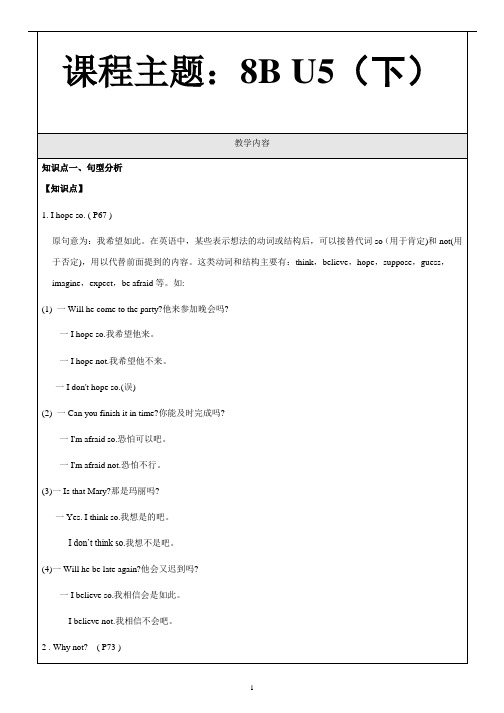
原句意为:为什么不要?why not意为“为什么不”,其后跟动词原形,这个句型还可以变成:Why don't you do sth.?表示“劝说、建议某人去做某事”。
如:Your spoken English is poor. Why not join an English club?你的英语口语很差。
为什么不参加一个英语俱乐部呢?Why not come early?=Why don't you come early?你为什么不早点来?常见的征求建议的句型还有:What/How about+名/词代词/v. -ing?……怎么样?如:What/How about going for a walk?去散步好吗?Shall we do...?我们做……好吗?如:Shall we play football?我们去踢足球好吗?Let's do…让我们做……吧。
如:Let's have a rest.让我们休息一会儿吧。
Would you like ( to do)...?你想(做)……吗?如:Would you like some bread?你想要些面包吗?3. These rules are important because we should make sure that both guests and hosts are comfortable at the table. (P77)原句意为:这些规则很重要,因为我们应该确保坐在桌子边的客人和主人都轻松自在。
句中的make sure意为“弄清楚;务必;确信”,其后多接that引导的宾语从句,有时也与of/about连用。
如:I make sure that I have turned the tap off.我确信我已关上了水龙头。
Please make sure of the time and place.请弄清楚时间和地点。
牛津译林版八年级下学期学案:8B UNIT 5-最新教学文档
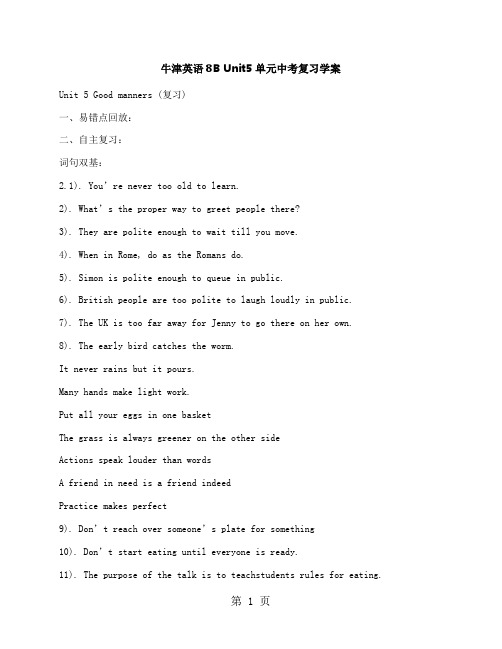
牛津英语8B Unit5单元中考复习学案Unit 5 Good manners (复习)一、易错点回放:二、自主复习:词句双基:2.1). You’re never too old to learn.2). What’s the proper way to greet peo ple there?3). They are polite enough to wait till you move.4). When in Rome, do as the Romans do.5). Simon is polite enough to queue in public.6). British people are too polite to laugh loudly in public.7). The UK is too far away for Jenny to go there on her own.8). The early bird catches the worm.It never rains but it pours.Many hands make light work.Put all your eggs in one basketThe grass is always greener on the other sideActions speak louder than wordsA friend in need is a friend indeedPractice makes perfect9). Don’t reach over someone’s plate for something10). Don’t start eating until everyone is ready.11). The purpose of the talk is to teachstudents rules for eating. 13). It is impolite to make too much noise while eating or drinking.三、语法知识疏理与反馈:1. ● to be (not ) adjective + enough + (for sb.)to do 用来描述一个人的品质和能力。
【牛津译林版】2011江苏地区英语八年级下册全套备课8BUnit5学案

牛津英语8B Unit 5单元教学要求四会词组:80 per cent of the cases of blindness, medical treatment, perform operations, use the plane as a teaching centre, watch the operations on video,pocket money, be used to , used to , health care , too…to , next to , World Vision , World Wide Fund for Nature, hope to help more people, be grateful to sb., carry on with, perform an operation, an advertisement for…leave sth. at one’s place, get out of the shower, in the shower, tell sb. not to do sth. used to, be used to, work in a hospital/be in hospital, operate on, be/work far away from , at first, spend time/money on sth, the lifestyle of a flying doctor, make the world a better place for the children, do sth. by doing sth. do some voluntary work, organize fund-raising activities, all over the world, set up, get money from donations, save some money, donate money to…, in many parts of the world, help sb. with sth., teach them about doing sth., be afraid of (doing) sth., see a TV programme about sth., train as a nurse, care about sb., do an important job, be grateful to sb., get good grades on one’s presentations, do a lot of good work重点句型:1.I used to spend all my money on CDs.2.Mr Wu says we all got good grades on our presentations.3.We are used to going to restaurants every weekend.4.She is used to working on a plan and is not afraid of flying any more.5.I hope to have a job like Mary’s when I finish school.6.What do you think about UNICEF?7.I used to spend all my pocket money on clothes and snacks.8.Protecting wildlife is important too.9.My mother also told me that pollution is a very serious problem in many parts of the world10.They should go to school instead of working to support their families.11.All children should have clean water and food so that they can be healthy.12.UNICEF helps governments and families make the world a better place for children.13.I’m too weak to walk .14.You used to be kind to me .15.I’m not used to going out before lunch .16.ORBIS uses the plane as a teaching centre17.By training local doctors and nurses, we hope to help more people.18.During my last visit, I operated on 150 patients on the plane. It’s hard work but I’m used to it now.19.People must be grateful to you.20.UNICEF wants to make the world a better place for children.21.Don’t tell him I’m in the shower.22.I’ll look at it when I get out of the shower.23. I left a book at your place yesterday.学优∷中(考],网。
【牛津译林版】江苏地区英语八年级下册全套备课:8B Unit 5-5、6 学案
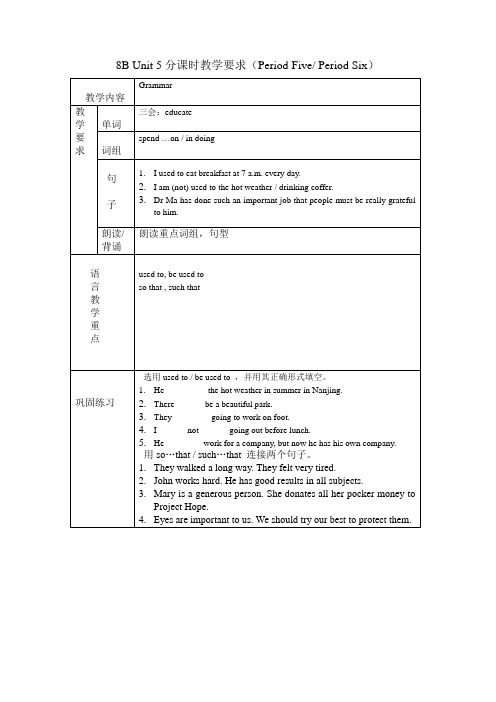
教学内容
Grammar
教
学
要
求
单词
三会:educate
词组
spend …on / in doing
句
子
1.I used to eat breakfast at7 a.m. every day.
2.I am (not) used to the hot weather / drinking coffer.
3.Mary is a generous person. She donates all her pocker money to Project Hope.
4.Eyes are important to us. We should try our best to protect them.
学﹤优╔中:考?,网
5.He ________ work for a company, but now he has his own company.
用so…that / such…that连接两个句子。
1.They walked a long way. They felt very tired.
2.John works hard. He has good results in all subjects.
1.He _________ the hot weather in summer inNanjing.
2.There ______ be a beautiful park.
3.They ________ going to work on foot.
4.I ____Байду номын сангаас_ not ______ going out before lunch.
牛津译林版八年级英语下册unit5全章学案
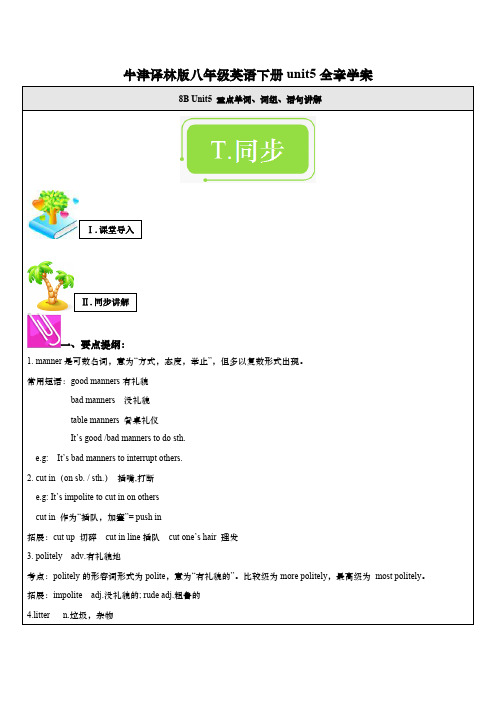
固定搭配:push in 插队,相当于 cut in
17. in oneຫໍສະໝຸດ s way 挡住某人的路e.g: Those stones are in our way.
in turn 依次,轮流
by turns 轮流,交替
7. leave 考点:①leave 用作及物动词,意为“留下,留给”时,常见的短语有 leave sb by oneself 或 leave sb alone(把某人独自
留下)
e.g: Mrs. Green is very busy with work and always leaves her son at home by himself.
②:遗忘
“遗忘某物”可以 forget 或 leave. leave 多与表示场所的副词,或以表示具体特点的词语相连。 forget 侧不接具 体的地点。
e.g: I left my umbrella at home. ③:离开 leave 可作及物动词或不及物动词。意为“出发,离开”。常用与短语“leave for some place"(动手去,出发 到)。
6.turn n.轮流,(轮流的)顺序
考点:It’s one’s turn 轮到某人了。
It’s one’s turn to do sth 轮到某人做某事了。
take turns to do sth = do sth by turns = take turns in (doing) sth 轮流做某事
e.g: It’s too dirty in the street. You can see litter everywhere.
考点: litter 的其他用法 词性
涵义
- 1、下载文档前请自行甄别文档内容的完整性,平台不提供额外的编辑、内容补充、找答案等附加服务。
- 2、"仅部分预览"的文档,不可在线预览部分如存在完整性等问题,可反馈申请退款(可完整预览的文档不适用该条件!)。
- 3、如文档侵犯您的权益,请联系客服反馈,我们会尽快为您处理(人工客服工作时间:9:00-18:30)。
8B Unit5 单词学案1.manners n. (复) 礼貌,礼仪;规矩good manners 有礼貌bad manners没有礼貌You are old enough to learn about manners now.It is bad manners to talk with your mouth full.2.cut in (on sb/sth)打断(谈话),插嘴Don’t cut in others.3.politely adv. 礼貌地Always wait politely. We should speak to the old people politely.形容词polite 有礼貌的impolite 没有礼貌地It is impolite to laugh at others.4.litter n.垃圾,杂物Don’t drop litter everywhere.5.tap n.水龙头;旋塞6.run v. 流动Look! The tap is still running . Turn it off. / Don’t leave the tap running.v. 跑;(车辆、机器)开动;运转过去式ran 过去分词run 现在分词runningThe boy ran away when he saw his father. / The machine runs very well.7.pick v. 采,摘pick flowers in the park8.obey v. 遵守,顺从obey traffic rules9.queue v. (人、车等)排队等候queue for your turn10.turn n.轮流,(轮流的)顺序It is one’s turn to do sth. 轮到某人做某事It is your turn to make a decision.take turns to do sth.= do sth. in turn= do sth. by turnsThey took turns to do the housework.=They did the housework in turn / by turns.11.proper adj. 符合习俗的;正确的副词properlyHe could not come up with a proper answer.12.greet v.问候,打招呼名词greeting greet each other 互相问候greet sb. with sth以...方式跟人打招呼The girl greeted us with a smile when we arrived.What’s the proper way to greet people there, Jenny?13.shake sb’s hands 与某人握手When you meet a person for the first time, you can shake his/ her hand.shake hands with sb. 和某人握手People usually shake hands with each other when they meet.14.kiss n. 亲吻复数kisses Do they greet people with a kiss?v 亲吻kiss sb. hello /goodbye 以亲吻问候某人/吻别15.close adj. 亲密的,严密的close friends 亲密的朋友She is my close friend.adj. (距离)靠近的;接近的be close to=near His house is close to the factory.v. 关闭Remember to close the door when you leave. 反义词openclosed 形容词“关着的”I found the door closed at that time. 反义词open16.conversation n. (非正式)交谈,谈话How do people start a conversation?17.avoid v. 避免You should avoid such mistakes.avoid doing sth. To avoid hitting the truck, he ran into the wall and his arm was badly hurt.18.subject n.话题,主题But please avoid subjects like age, weight or money.n.科目My favourite subject is English.19.behave v. 表现名词behavior “行为”behave well/badly 举止得体/恶劣behave oneself “有礼貌或行为检点”Please behave yourself before the guests.20.public n.民众,群体The museum is open to the public every day.in public 公开地,在别人面前Don’t speak loudly in public.Do people there behave politely in public?21.push v.推,挤push in <英>插队,加塞=<美>cut in It is rude to push in before others.22.bump v. 撞,碰I bumped my knee on the wall.bump into sb. 撞到某人身上If they bump into someone in the street, they will say “sorry”.23.in one’s way 挡住某人的路You will have to move ----you are in my way.24.touch v. 触摸,碰Please don’t touch anything in the room.v. 感动,触动The story of the ugly man Quasimodo really touched me.n. 触摸,碰,触觉keep in touch “保持联系”in touch with “与...联系”out of touch “不了解某事”25.excuse v. 原谅,宽恕excuse me 劳驾They will say “excuse me ” and be polite enough to wait till you move.问路/姓名Excuse me , where is the shop? 打扰一下,请问商店在哪儿?客气地请求允许Excuse me, may I ask you a question?打扰一下,我能问一个问题吗?客气地纠正别人的话Excuse me, it is a bird. 抱歉,这是一只鸟。
打扰他人Excuse me, I’d like you to move a little. 打扰了,我想让您稍微移一下。
26.till conj. 到...时,直到...为止=until(位于句首时,只能用until)prep. 到...时,直到...为止They talked from morning till night.27.as well (as) 也,还有British people are very polite at home as well, aren’t they?My brother also likes playing football. =My brother likes playing football as well.=My brother likes playing football, too.My brother does not like playing football either.as well as “也,还有” The boss provided lunch as well as breakfast.28.loudly adv. 大声地British people don’t like to shout or laugh loudly.29.as conj. 正如,如同As you know, Julie is leaving soon.conj. 当...的时候As I was coming here, I met your brother.conj. 因为,由于As it was raining, I stayed at home.as...as...像;如何the same ...as 和...一样as soon as possible 尽快地as if 好像such as 比如30.saying n. 谚语,格言Just as the saying goes ,“No pain, no gain.”31.Roman n. 罗马人Just as the saying goes, “When in Rome, do as the Romans do.”adj. 罗马的,罗马帝国的We will live in a Roman hotel tonight.32.by accident 偶然,意外地hit someone or something by accident33.discussion n. 讨论discuss v.讨论She did not join the discussion.have a discussion with sb. 和某人讨论discuss sth with sb. 和某人讨论某事They are discussing the problem with the teachers.34.express v.表达expression n. 表达,表示beyond expression 无法形容express oneself 表明态度He did not express himself clearly.35.public adj. 公共的,公开的public signs36.explain v. 解释I don’t want to explain anything.explain sth to sb.向某人解释某事Mr Wu is patient enough to explain things to us.37.keep sb. from sth.保护,使免受Keep us safe from danger.keep sb./sth+adj.使某人/某物保持某种状态I keep the window open because it is too hot.keep sb. doing sth.让某人一直做某事My father keeps me staying at home.keep sb. from doing sth. 阻止某人做某事Tom tried to keep himself from sleeping.38.warn v. 警告,告诫warn sb. (not ) to do sth. 警告某人(不)要做某事The police warned us not to go out alone at night.warn sb. of/about sth. 警告某人某事I warned him of /about the danger.39.parking n. 停车There is a public sign saying “No Parking”.40.litter v.乱丢杂物There is a public sign saying “No Littering”.41.successful adj. 成功的successfully adv. 成功地success n.成功succeed v.成功42.sometime adv. 在某时=some time Everybody will be lucky or successful sometime in their life.Some time 还可表示“一段时间”He spends some time reading books every day.sometimes=at times=from time to time 有时He sometimes has a walk after supper.some times 几次He has been to Beijing some times.43.soon after 不久以后When one bad thing happens to you, other bad things happen soon after.44.risk v.冒险做risk doing sth. risk losing everything all at one timerisk n. at the risk of “冒着...危险”The driver saved her life at the risk of his own.45.worm n.软体虫,蠕虫The early bird catches the worm.46.pain n.疼痛The girl cried with pain.have a pain in one’s stomach /leg 胃疼/腿疼...47.gain n. 收获No pain, no gain.gain v. 赢得,获得She gained the trust of her teacher.48.indeed adv. 真正地A friend in need is a friend indeed.49.practice n. 练习Practice makes perfect.practice v. 练习practice doing sth He practices playing the piano every day.50.candle n.蜡烛burn the candles at both ends51.purpose n.目的What was the purpose of his visit.on purpose 故意地with the purpose of ...以...为目的52.content n.内容,目录53.conclusion n.总结,归纳conclude v. 总结come to / arrive at /reach /draw a conclusion 得出结论in conclusion 最后,总之make a conclusion 下结论54.guest n. 客人,宾客We have guests staying this weekend.55.host n. 主人,主持女主人hostessWe should know these rules to make sure that both guests and hosts are comfortable at the table.56.above all 首要的是Above all, tell me quickly what I should do.57.impolite adj. 不礼貌的反义词:polite It is impolite to spit in public.。
